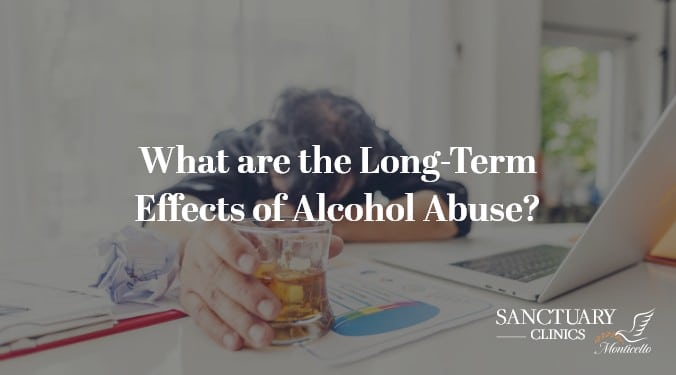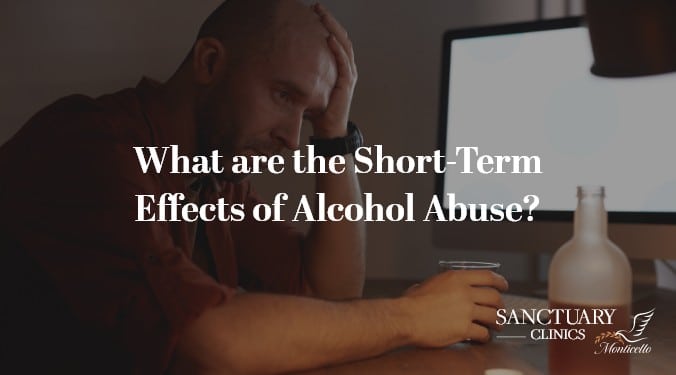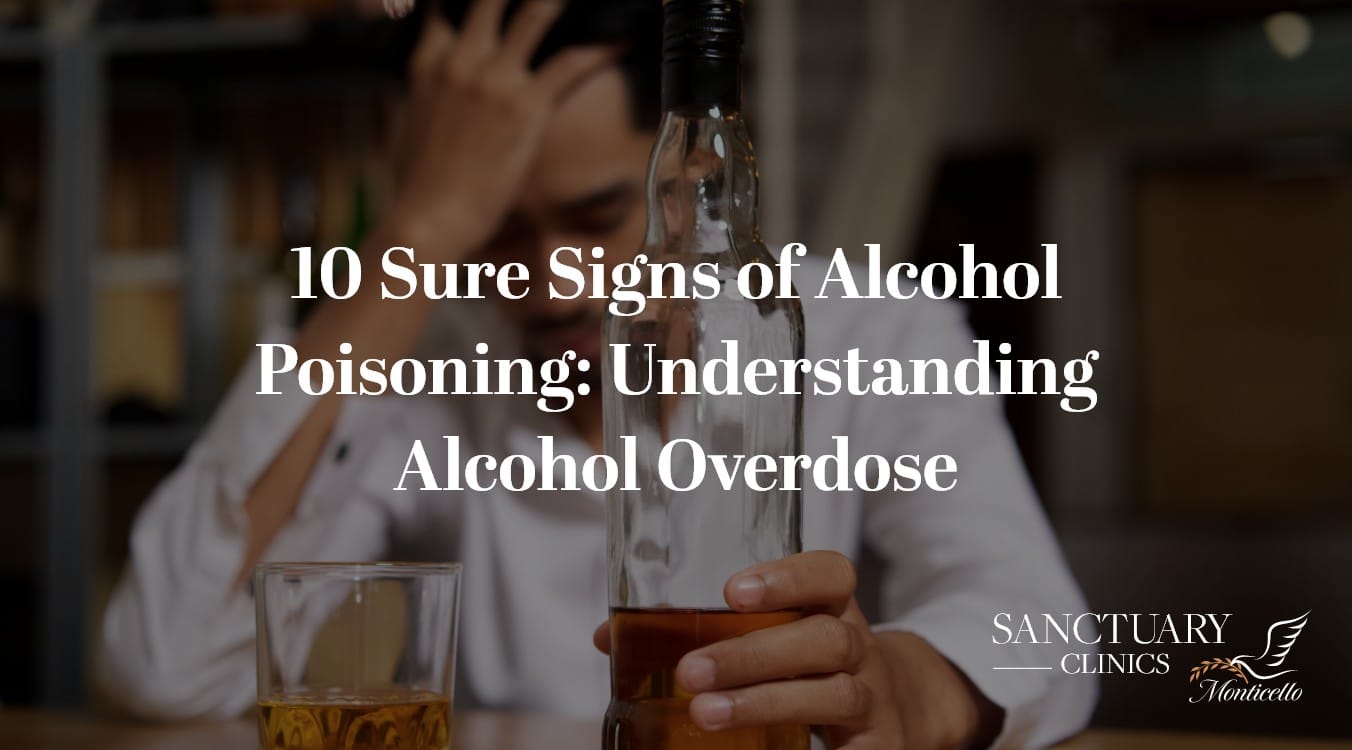You reach for another drink at the party. You order more drinks at the bar. You drink after work and even before work. You drink when you said you wouldn’t drink. These are signs you may be abusing alcohol, and over the long-term, this can lead to harmful effects on your life.
Drinking heavily over prolonged periods carries many risks to your body and mind; and in fact, some of these risks cannot be reversed by quitting alcohol. Also, despite some reports which suggest a benefit to moderate wine drinking, there is no level of alcohol consumption that improves health. 1 It is believed consuming on average more than two standard drinks a day can cause many long-term health problems and other harms. In this article, we will look at some of the long-term effects of alcohol abuse.
The long-term effects of alcohol abuse can be categoried into physical effects, psychiatric/physiological effects, and social effects. These categories can include symptoms such as high blood pressure, stroke, liver damage, gastric issues, brain damage, intestinal problems, and fertility issues, among others.
Definitions of alcohol use and abuse
Heavy drinking is defined as more than 40 grams of pure alcohol a day for men and 20 grams a day of pure alcohol a day for women.
Binge drinking is defined as 60 grams of pure alcohol or at least five standard drinks in a single sitting. These two contribute significantly to the burden of disease and injury due to alcohol use.
Alcohol use disorder is characterized by repeated use of alcohol despite significant problems associated with its use.
What are the warning signs of alcohol abuse?
Alcohol abuse can be recognized by certain behaviors which act as warning signs a person may be suffering from this. These include:
- The consumption of increasing amounts of alcohol and frequent intoxication
- Being preoccupied with drinking to the extent of excluding other activities
- Promising to quit drinking and failing to keep these promises
- Frequent blackouts, where a person is unable to remember what was done while drinking
- Dysfunction in school or at work
- Loss of interest in personal hygiene and general appearances
- General poor health
These are just a few of the warning signs someone may be abusing alcohol. Next, we will look at some of the long-term effects of alcohol abuse.
Long-term effects of alcohol abuse
We will classify these effects of alcohol into different categories to fully understand the extent of the damage to your life.
a) Physical effects of long-term alcohol abuse
WHO (World Health Organization) did a comparative risk assessment which showed the detrimental impact of alcohol consumption on global health was surpassed only by unsafe sex and childhood underweight status. It exceeded several classical risk factors such as unsafe water and sanitation, hypertension, high cholesterol, and tobacco use. This may be surprising to some, but it is due to the net effect alcohol consumption has on human life.
Alcohol use leads to increased risk for premature death and disability worldwide. It remains the leading cause of mortality for people aged 15 to 49 years old worldwide. 2Alcohol is an underlying cause for around 30 medical conditions and a contributing factor to many more.
Some of the long-term physical effects of alcohol on the body include:
- High blood pressure, stroke, and other heart-related diseases
- Liver damage and liver disease, including cirrhosis
- Gastric issues such as gastric reflux, gastritis, bleeds, and ulcers
- Brain damage and brain-related conditions such as stroke and dementia
- Problems with lymphatic drainage causing a build-up of fluid in the lower extremities
- Increased risk of developing intestinal problems such as inflammation, diarrhea, constipation, and IBS
- Increased risk of developing several alcohol-related cancers e.g., gastric cancer, large and small bowel cancer, breast cancer, oral cancer, nasopharyngeal cancer, esophageal cancer, and liver cancer
- Fertility issues such as reduced sperm count and reduced testosterone levels in men. This can eventually lead to impotence.
- Nerve damage
- Malnutrition. Alcohol prevents the absorption of vital vitamins and nutrients which can lead to depletion over time.
- Vitamin B1 deficiency which can lead to a disorder characterized by amnesia, apathy, and disorientation
- Weight loss/gain
b) Psychiatric/psychological effects of long-term alcohol abuse
As well as causing harm to the body’s vital organs, alcohol abuse can affect you psychologically. Long-term misuse of alcohol can cause several mental health problems. The damage to your brain leads to several issues, and alcohol can even cause permanent, irreversible brain damage. Some other psychiatric/psychological effects include:
- Increased chance of developing alcohol addiction
- A chronic and progressive life-threatening brain disorder
- Increased risk of developing mental health problems and illnesses including anxiety disorder, depression, and psychosis
- Severe cognitive problems are common. Approximately ten percent of all dementia cases are related to alcohol consumption, making it the second leading cause of dementia.
- Increased risk of developing Wernicke’s encephalopathy and Korsakoff’s psychosis. Wernicke-Korsakoff’s syndrome (commonly known as the wet brain) cannot be reversed and is a lifelong debilitating brain disease.
- Increased risk of memory problems
- Reduced and impaired cognitive ability due to the brains cells and tissues being damaged
- Increased risk of suicide
- Panic disorder which can develop or worsen as a direct result of long-term alcohol misuse
- The use of alcohol with other drugs also may lead to further psychiatric diagnoses for both men and women.
For example, women may suffer major depression, anxiety, panic disorder, bulimia, post-traumatic stress disorder (PTSD), or borderline personality disorder. Men may suffer from a narcissistic or antisocial personality disorder, bipolar disorder, schizophrenia, impulse disorders, or attention-deficit/hyperactivity disorder (ADHD).
Additionally, women with alcohol use disorder are more likely to experience physical or sexual assault, abuse, and domestic violence than women in the general population. This can lead to more psychiatric disorders and greater dependence on alcohol.
c) Social effects of long-term alcohol abuse
Serious social problems arise from alcohol abuse. These dilemmas are caused by the pathological changes in your brain and the intoxicating effects of alcohol. There is an increased risk of committing criminal offenses like domestic violence, rape, assault, burglary, and child abuse.
Other effects include:
- Loss of job or ability to work leading to financial problems
- Inappropriate behavior caused by impaired judgment such as public disorder, drunk driving, and wrongful behavior like property damage. This may lead to legal consequences such as criminal charges.
- Withdrawal from family and friends
- Interpersonal issues with family and friends. This includes marital conflict, domestic violence, and even divorce.
- It can also lead to child neglect, and the children of people who abuse alcohol may grow up with emotional problems which manifest later in life.
- Loss of interest in the things you once used to enjoy such as family time and hobbies
- Increasing self-neglect, poor hygiene, and nutrition
- Perception problems
- The ability to understand humor is also impaired due to damage to the brain.
Conclusion
As seen from these long-term effects of alcohol abuse, it is important to monitor your alcohol consumption as part of a healthy diet. The best alternative would be to stop drinking altogether, as alcohol consumption in the wrong manner can lead to severe physical and psychological issues which can then translate into problems in the long run. As a problem which plagues a huge number of the human population, it is key alcohol abuse is addressed accordingly.
Sources
- Burton, R., & Sheron, N. (2018). No level of alcohol consumption improves health. The Lancet, 392(10152), 987-988.
- American Psychiatric Association. (2013). Diagnostic and Statistical Manual of Mental Disorders (5th ed.). Arlington, VA








